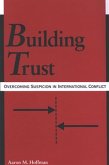Neither rational choice theory, with its emphasis on interest calculation, nor sociological institutionalist theory, with its emphasis on identity-defined rule following, indicates how governments determine which of their multiple interests or identities are at stake in a particular situation or how they develop mutual comprehension of each other's goals. International Regimes for the Final Frontier addresses these gaps by tracing how governments approach an unfamiliar issue--in this case, international agreements regulating human activity in outer space between 1958 and 1988--and examines three ways situation definitions channel governments' approaches to issues or problems.
Hinweis: Dieser Artikel kann nur an eine deutsche Lieferadresse ausgeliefert werden.
Hinweis: Dieser Artikel kann nur an eine deutsche Lieferadresse ausgeliefert werden.








